| Older Posts |
Million Dollar Home Sales Peaked In 2021, 2022 |
|
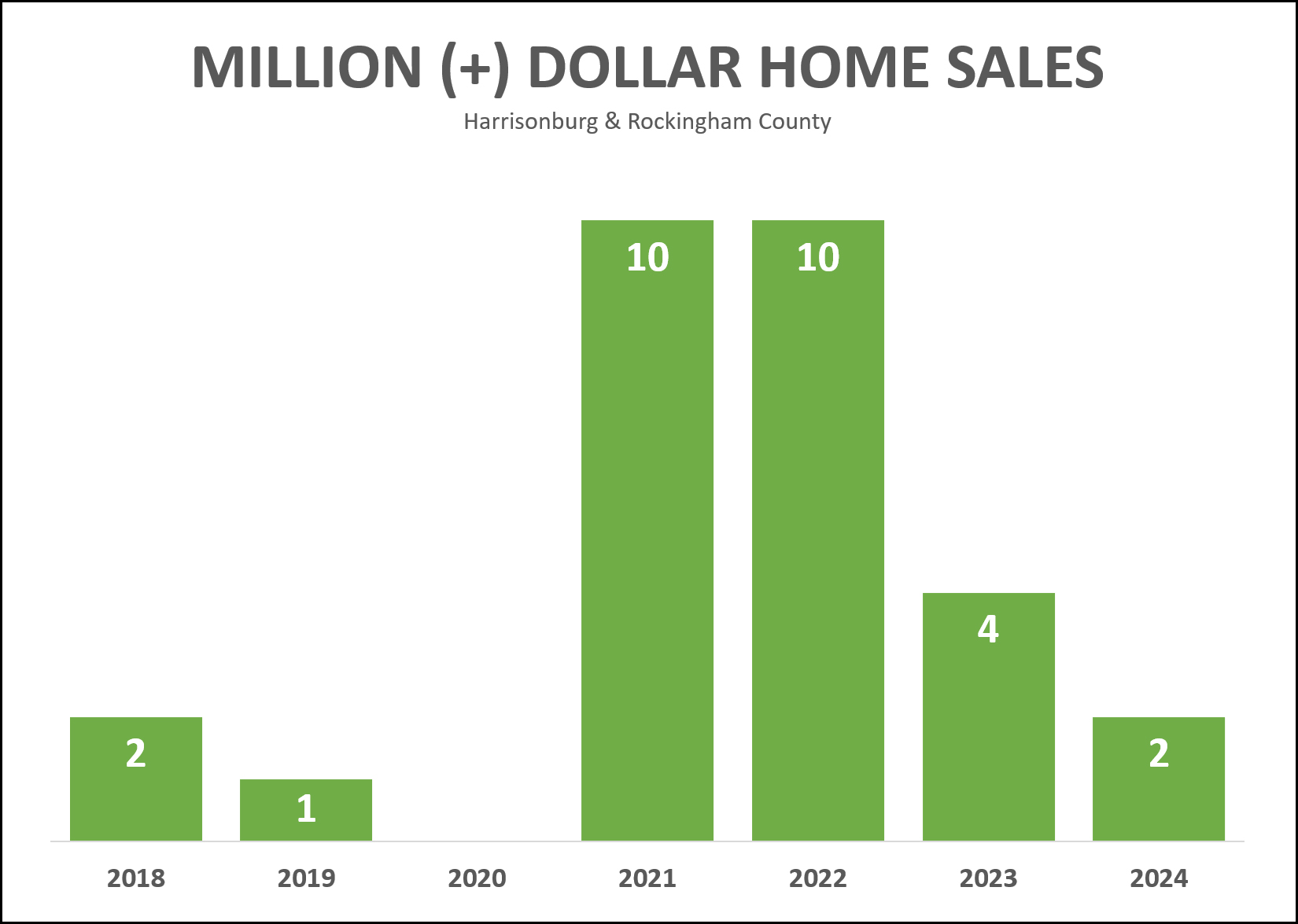 Between 2018 and 2020 there were only three million dollar home sales in Harrisonburg and Rockingham County area as recorded in the HRAR MLS. Then, in 2021, we saw (10) million dollar (+) home sales, and then (10) more such sales in 2022! Home prices were certainly increasing between 2018 and 2021, so one of the reasons we saw more million dollar home sales was certainly because of increases in those home values. But then -- we only saw (4) such sales in 2023. One theory here is that the increase in mortgage interest rates in 2022 and then 2023 resulted in fewer buyers being willing to pay a million bucks (or more) for a home. Thus far in 2024, we have seen two of these million dollar (+) home sales in the first four(ish) months of the year -- though there are four other million (+) dollar listings that are under contract and waiting to make it to closing. If you're eager to purchase a million dollar home in Harrisonburg or Rockingham County, these are your (14) current options. | |
What Would You Buy If EVERY Existing House Were Offered For Sale? |
|
 What Would You Buy If EVERY Existing House Were Offered For Sale? This can be a helpful question -- though often not specifically productive. Sometimes it can be worthwhile in a home search to take a step back and think about what home (or type of home) you would buy if EVERY existing home were offered for sale. In the current local housing market, with a limited number of homes for sale at any given point, it can be easy to get stuck within the confines of thinking about only the homes that are for sale yesterday, today and tomorrow. But ignore those confines for a moment... what if EVERY existing home in Harrisonburg and Rockingham County were currently offered for sale?!? What would you buy?? This can be a helpful question for broadly exploring what you like, hope for, strive for, and more. It's worth taking the time to work through this exercise. We will then, of course, have to dial it back into the confines of reality... and how often such a home might come on the market for sale and how long you are willing to wait for that ideal vision. So, it's not always a specifically productive question -- but it can be helpful in exploring what you really want in your next house. | |
How Much Can You, And Should You, Spend On Your Next Home? |
|
 There are LOTS of ways to answer this question, usually within the context of a monthly payment...
The other question (how much should you spend) could be discussed with your spouse, your family, your loan officer, your peers, me, etc. The most important part -- is to have these conversations. We need to know how much money you can spend and how much you are willing to spend on your new home, so that we can be looking for the right houses for you! | |
How Much Will Your Mortgage Payment Change If You Sell Your Home And Buy A New One? |
|
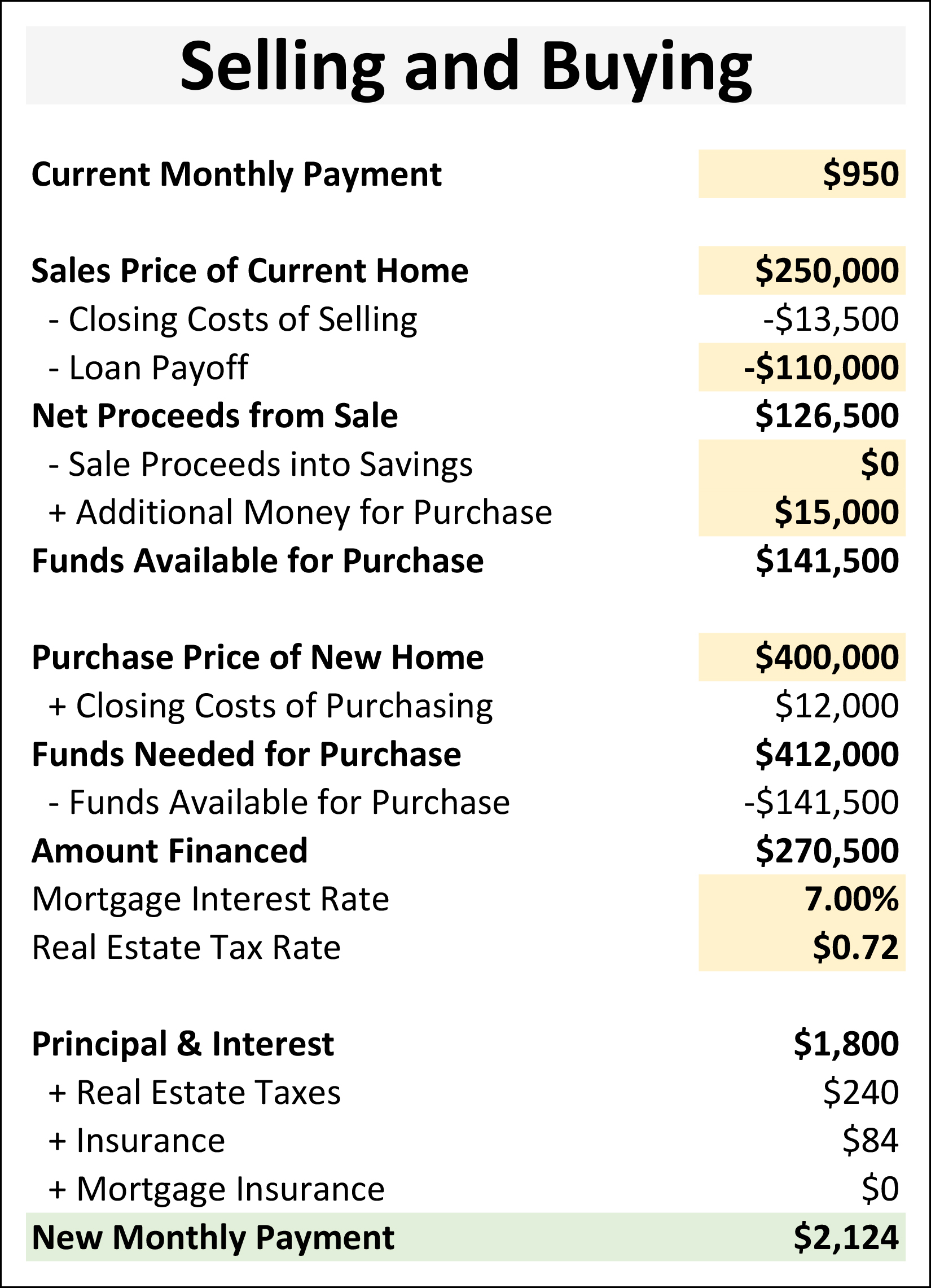 If you will be selling your home to buy another, there are a lot of numbers floating around....
Above you will see a spreadsheet I put together to help you think about some of these numbers as you are evaluating if and when you will make a move to a new house. In yellow, are all of the inputs you will need to provide, or that you and I can determine together, such as your current payment, your home's current value, your mortgage payoff, whether you will be putting any additional money into the transaction, etc. In green, I have identified your potential future mortgage payment and the net change in your monthly payment. All of the numbers without a background color will automatically calculate for you. Click here to download this worksheet as an editable Excel file. | |
Many (Or Most?) Home Sellers Prioritize Certainty Over Price |
|
 When a seller signs a contract with a buyer, they want to be as certain as possible that the contract will proceed to settlement. The king of all offers, providing the most certainty to a seller would be a cash offer with no contingencies whatsoever. As each of the contingencies below are added to a contract, the seller's certainty decreases...
It is important, as a buyer, to remember that most sellers are thinking about certainty alongside price. Which of these offers is likely to succeed?
When presented with these three offers I think many or most sellers would choose offer #1 even though it is $1K or $5K lower than the other two offers in hand. Give careful thought to the contingencies you do and do not include in your offer and understand how they affect the seller's view of the certainty that your contract will make it to settlement. | |
What Prices Did Buyers Pay For New Homes Over The Past Year? |
|
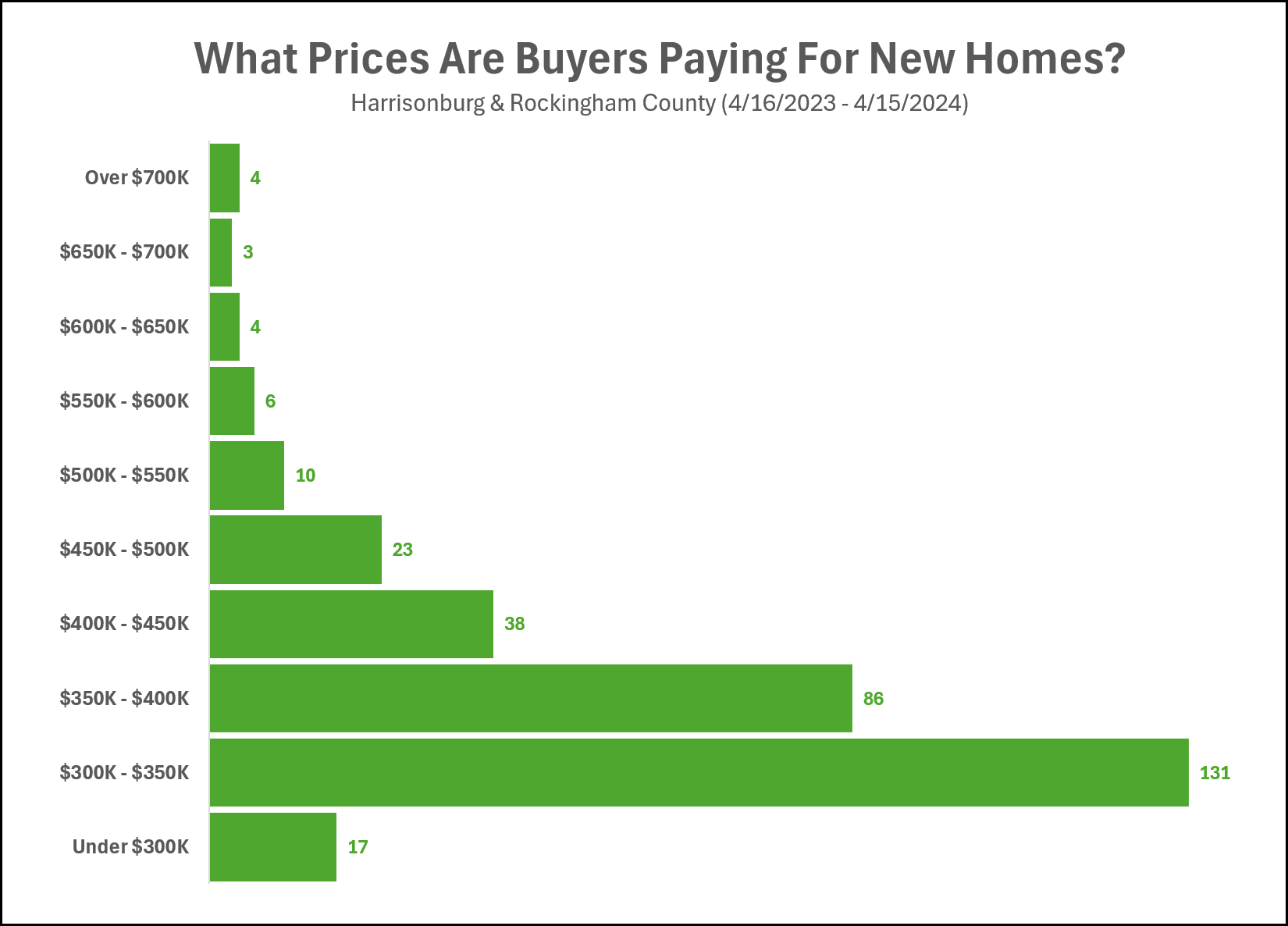 Over the past year, 322 new home sales have been recorded in the HRAR MLS. The full breakdown is above, but here are a few highlights of what buyers paid for new homes in Harrisonburg and Rockingham County over the past 12 months...
A few more details not shown in the data above...
| |
It Is Not Your Imagination. There Have Been Fewer Resale Homes Listed For Sale This Year |
|
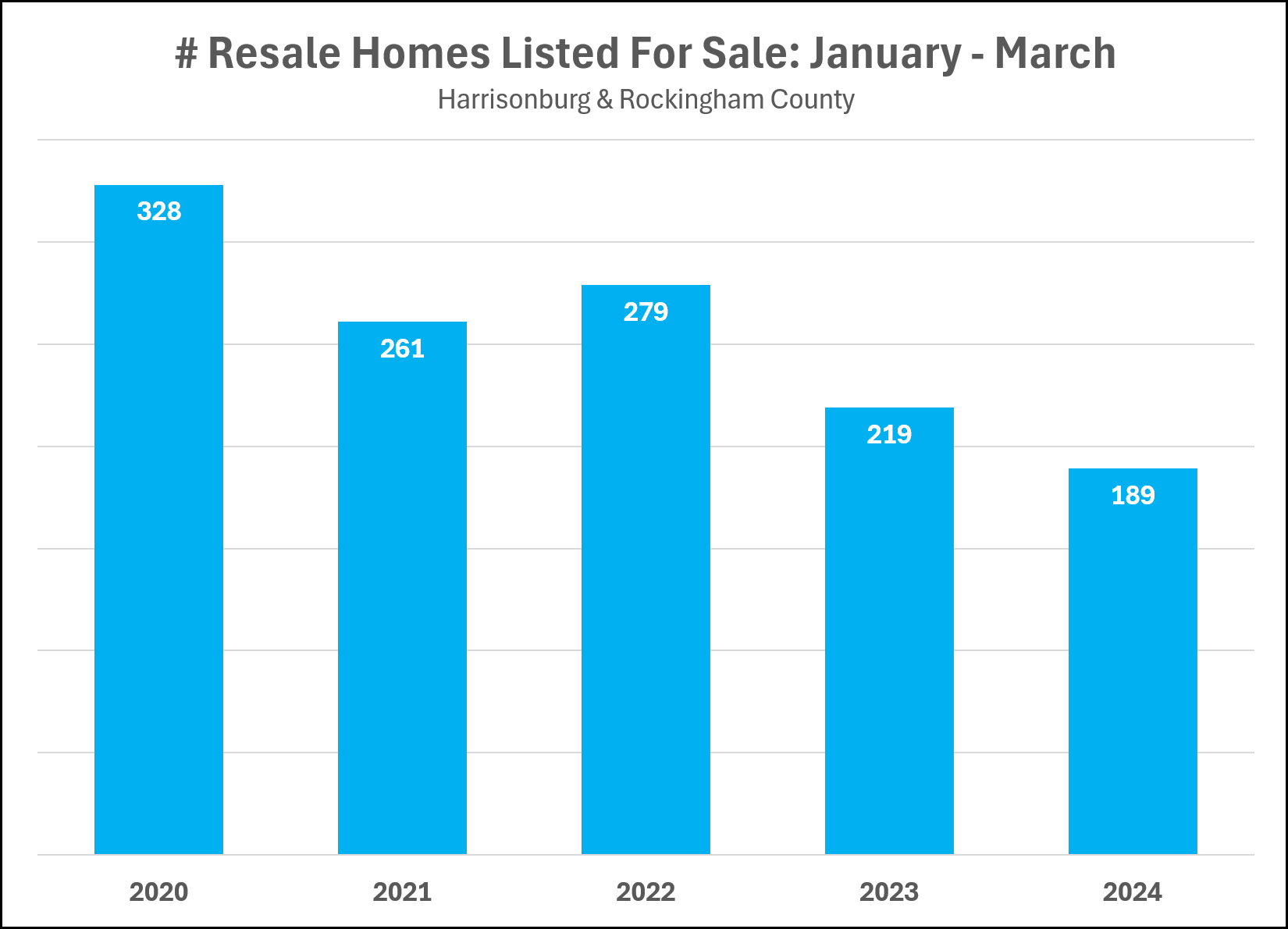 Quite a few home buyers (or would-be home buyers) have asked me lately about whether we are seeing fewer resale homes (not new construction) being listed for sale in Harrisonburg and Rockingham County. Indeed, as shown above, we have seen fewer resale homes listed for sale in the first quarter of this year than in any other recent year. So, it's not just your imagination -- if you're looking to buy a resale home, you have had fewer choices thus far in 2024. But... we're in the thick of the spring market now... with 75 homes listed for sale thus far in April... so the spring and summer market of 2024 will be kinder to would-be buyers than the first three months have. | |
Strong Contract Activity Continues Into April |
|
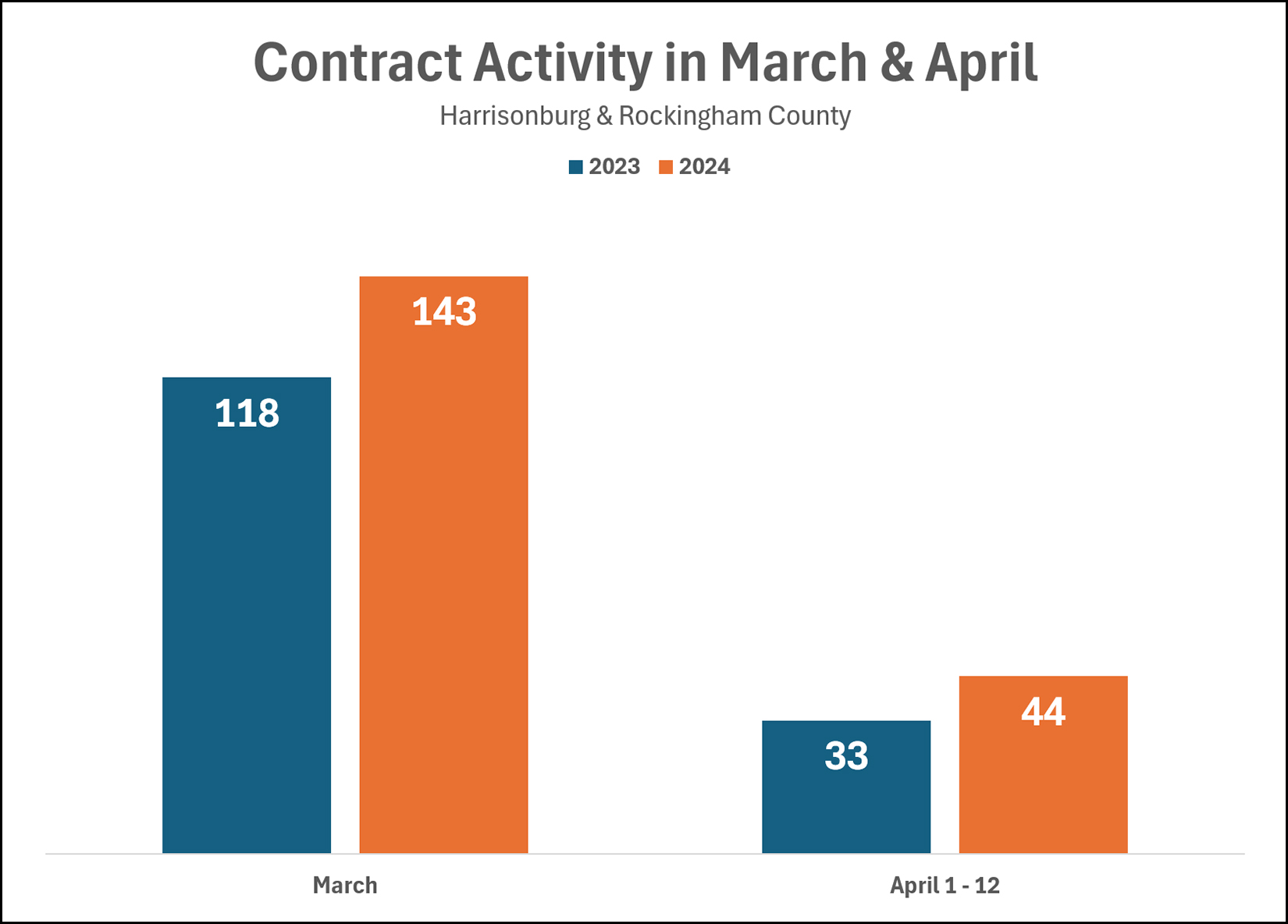 We saw a surprisingly high number of homes go under contract in March this year... 143 of them, compared to only 118 last March. And... this April is also starting off strong compared to last April. In the first 12 days of this month (through this past Friday) we saw 44 houses go under contract in Harrisonburg and Rockingham County compared to only 33 last April. It is turning into a busy spring in the local housing market! | |
A Year From Now, Mortgage Interest Rates Seem Unlikely To Be Much Below Six Percent |
|
 The current average 30 year fixed mortgage interest rate is 6.82%. If you are waiting to buy a home until mortgage interest rates fall below 6% you might be waiting a while. A compilation of mortgage interest rate projections by Fast Company (here) show the following projected mortgage interest rates for the first and second quarter of 2025... Mortgage Bankers Association: 5.9% in 2025-Q1 5.8% in 2025-Q2 Fannie Mae: 6.3% in 2025-Q1 6.2% in 2025-Q2 Wells Fargo: 6.0% in 2025-Q1 5.9% in 2025-Q2 It seems that mortgage interest rates may very well stay near, at or above 6% for at least the next year. Read more here. | |
How Long Will You Stay In Your Home? |
|
 It seems homeowners are staying in their homes much longer now than they did two decades ago... with the median homeowner tenure having risen from 6.5 years in 2006 to 11.9 years today. This analysis of homeowner tenure is thanks to a recent analysis by Redfin... A few reasons for this increase in homeowner tenure seem to include... [1] Older Americans staying in their homes longer. [2] More recently, the sticky-ness of low fixed mortgage interest rates. A few results of this increase in homeowner tenure seem to include... [1] Lower inventory levels of resale homes. [2] Continued increases in home values. When I ask folks that I encounter on a day to day basis how long they will stay in their current homes, I often am told that they will stay in their current homes for a very long time, if not forever. This is largely because... [1] They bought their home when home values were lower or significantly lower than they are now, and they are enjoying a relatively low mortgage balance compared to current home values. [2] They bought their home when mortgage interest rates were below 4%... or they refinanced their mortgage when interest rates were below 4%, and they do not want their housing payments to increase if they obtain a new mortgage above 6%. How long will you stay in your home? I plan to stay in mine for quite a while! | |
Another Buyer May Be Able Or Willing To Pay More Than You |
|
 Many homes in many price ranges are still receiving multiple offers. Thus, a variety of questions may run through your mind if you are making an offer on a popular new listing... [1] How much is this home worth? [2] How much am I willing to pay for this house? [3] Will I win the bidding war? The challenge in answering #3 above is often not in the answer to #1 but in other buyer's answer to #2. It's note quite this black and white, but let's pretend that you and the three other buyers who are making an offer all conclude that the home is worth $350K. You love the house but your budget is capped at $360K. You offer to pay up to $360K. The second buyer won't pay a dime over market value, so they offer $350K. The third buyer has a budget that goes up to $500K, so they are willing to pay up to $370K for the house. Depending on the other terms of the offer, the third buyer is likely to secure the contract on the house. As another example... Let's again pretend that the home in question is worth $350K, but it needs some updates. You love the house, but given the need for some updates you are not comfortable paying more than $350K. The second buyer offers $340K because of the need for updates. The third buyer is super handy and will make all of the updates themselves and has plenty of cash to spare for supplies, etc., so they offer to pay up to $360K. Again, depending on the other terms of the offer, the third buyer is likely to secure the contract on the house. In any given multiple offer scenario, you must remember (as a buyer) that other buyers might be able or willing to pay more than you. | |
You Can Change A Lot About A House, But Not The Location Or Neighborhood |
|
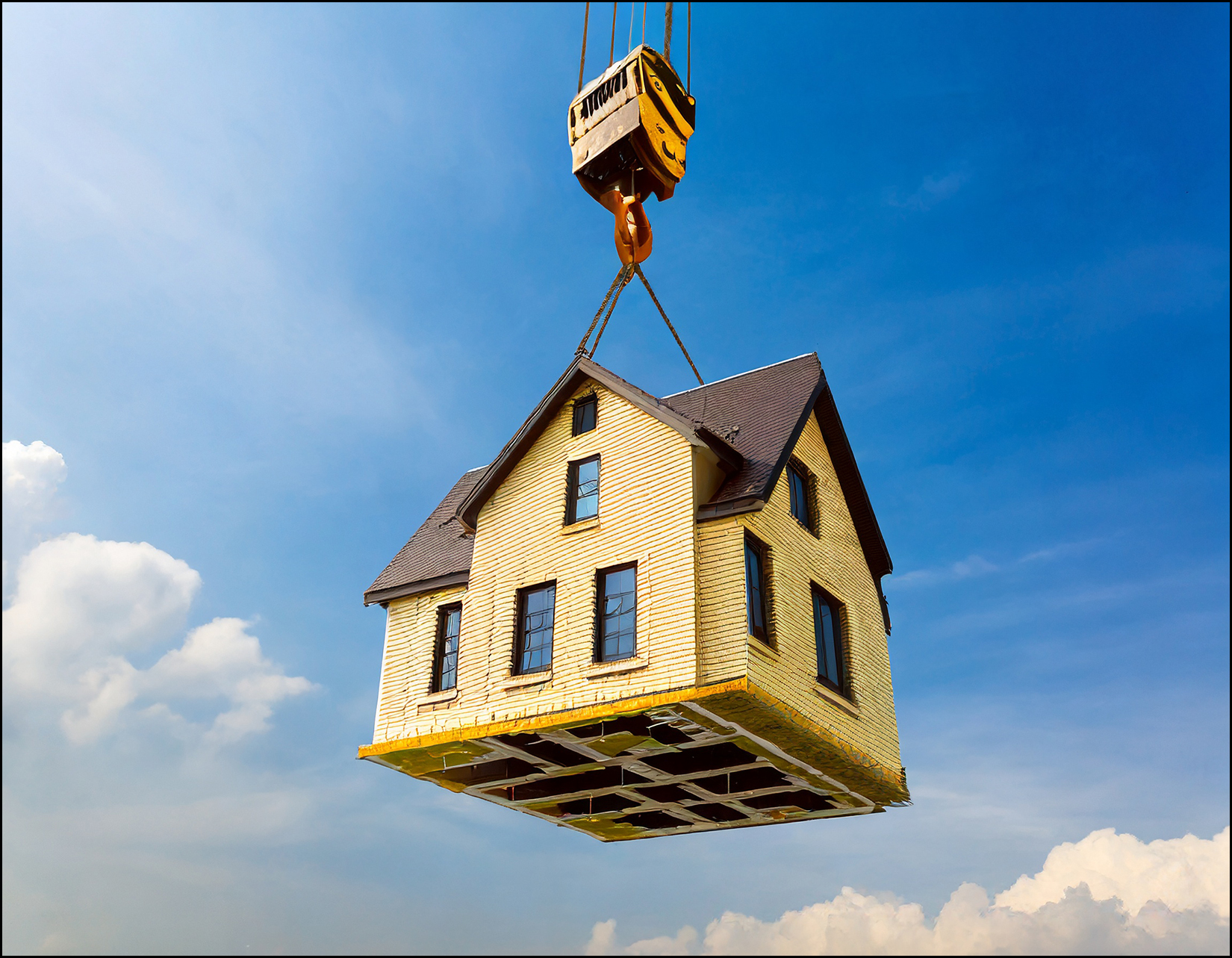 That house is PERFECT! It has the right amount of bedrooms, it's the perfect size, I love the flow of the main living spaces, and the exterior siding and landscaping are just what I'm looking for in a home. But... it's not in the neighborhood or location where I'd like to live. Most buyers won't buy the house described above, because they won't be able to change the location or neighborhood of the house. You can finish some basement space to add a bedroom. You can build an addition to create more living space. You can open up some walls or close in some openings to affect the flow of the main living spaces. You can paint or replace exterior siding. You can add, remove or change the landscaping. But... you can't change the location or neighborhood where that house is situated. ** Yes, I understand that technically you could move a house, but it's rather cost prohibitive. ;-) So... if you see a house that you love, but it's in the wrong neighborhood or location... chances are, you won't end up buying it. Buy a house based on the things you cannot change... and be willing to change the things you can. | |
Make The Most Of Each New Listing This Spring! |
|
 With mortgage interest rates still above 6% and with the vast majority of homeowners having mortgage interest rates below 4%, there will likely be far fewer new listings this spring. Why, after all, would a homeowner want to sell, pay off their mortgage with a 4% interest rate and buy, obtaining a new mortgage above 6%? Certainly, there are still plenty of reasons why homeowners will sell their homes even give the mortgage interest rate dynamic described above. Some may be moving out of the area, or moving to a different neighborhood or school district, or moving to have more space, or to have less maintenance. But the difference in most current mortgage holder's rates and current market rates is likely to continue to suppress the number of new listings we will see hitting the market. As such, if you're looking to buy a home this spring -- because you are moving into the area, or because you are currently renting, or for any other reason -- you should make the most of each new listing. Talk to your mortgage lender to get pre-approved... now. Go see each new listing of potential interest.. .quickly. Be ready to make a decision about an offer... quickly. | |
The Differential Value In Your Escalation Clause Should Likely Vary Based On The Other Terms Of Your Offer |
|
 We're still in a housing market where many new listings will have multiple offers within a few days -- not all new listings, and maybe not most -- but many. As such, if you are hoping to buy a home this spring or summer you may find yourself competing against another buyer (or buyers) when you make an offer. If you are making an offer, and competing against one or more other offers, you may find yourself including an escalation clause in your contract. How does an escalation clause work, you might ask? An escalation clause allows you to make an offer at one price but include offer terms that will automatically increase that offer if another offer is at a higher price point. For example... offering $325K... but automatically increasing your offer up to $340K if there is another higher offer. One missing element of the description above is the differential value in your escalation clause. Here are two different versions of the escalation clause above, with differential values... [1] Offer of $325K, automatically increasing to be $1K above other offers, up to a maximum of $340K. [2] Offer of $325K, automatically increasing to be $5K above other offers, up to a maximum of $340K. Let's say, for illustrative purposes, that you are (unbeknownst to you) competing with an offer of $330K. The first escalation clause above [1] would cause your offer to be $331K. The second escalation clause above [2] would cause your offer to be $335K. Why would you include a differential of $1K vs. $5K vs. something even higher? Oftentimes, it depends on the other terms of your offer. If you are making a very clean offer with an 80% financing contingency, no home inspection, no home sale contingency and a speedy proposed settlement... you might just include a $1K differential in your escalation clause. The thought or hope in this instance is that your offer terms (other than price) will be equal to or better than the competing offer, and that your offer being $1K higher is enough of a difference to hopefully cause the seller to accept your offer. If you are making an offer with a smaller downpayment (95% financing), and with an inspection contingency... and if you suspect you are competing against buyers with larger downpayments or without inspection contingencies... you might include a larger differential in your escalation clause. The thought here is that if your offer with an inspection contingency is only $1K higher than a competing offer without an an inspection contingency, the seller will likely accept the other offer... but if you are offering (via the differential in your escalation clause) a price that is $3K (or $5K) higher than the competition, maybe that differential will be enough to cause the seller to still consider your offer despite the inspection contingency. And so on and so on. If you are proposing a delayed settlement date, increase the differential. If you have a home sale contingency as well, increase the differential. You can't know the details of the terms of the offer with which you are competing... but you can be strategic about how you craft the terms of your escalation clause based on the other terms of your offer. | |
Even If You LOVE A House, You Will Probably Only Be Willing To Pay So Much Or Remove So Many Contingencies |
|
 Sometimes we end up searching for a home you LOVE for quite a while! Sometimes we never find a house that you completely LOVE but we find one that you like, a LOT. But, yes, sometimes we find a house that you absolutely LOVE!!! And yet... 1. You are probably only willing to pay so much for that house that you love. If a house is priced at $400K and that price is in line with recently sold properties, and it is an absolutely perfect fit for what you want in a home, and like nothing we have seen in over six months of searching... then you might be willing to pay $425K for the house. But you probably wouldn't pay $450K. There is a limit, for most buyers, of how much they'll pay even if it is an absolutely perfect fit. 2. You are probably only willing to remove so many contingencies from your offer. Will you remove an inspection contingency from your offer on an absolutely perfect house? Maybe, maybe not. Will you remove an appraisal contingency for said house? Maybe, maybe not. Will you liquidate assets to pay cash instead of having a financing contingency? Maybe, maybe not. Will you take on the risk of having two mortgages and remove a home sale contingency? Maybe, maybe not. For any given house, even one that you LOVE, we'll have to discuss how far you are willing to go to buy that house -- relative to price, and contingencies. | |
Consider Reverse Buyer Remorse When Deciding Whether To Make An Offer On A New Listing |
|
 So, you followed my advice and we went to see that new listing on the first or second day it was listed for sale. Great! Buyers in most price ranges in Harrisonburg and Rockingham County still often need to see a home rather quickly when it hits the market in order to have a chance to make an offer. But now, you don't know what to do. You like the house a lot... but maybe you don't love it. You recognize that it checks off a lot of boxes of what you are looking for in a home... but you weren't immediately convinced that this was "the one" for you. So, what do you do? Do you make an offer? Do you decide not to make an offer? Do you keep thinking about it for a few days even though that might mean you miss out on the chance to buy it? It can often be helpful to think about this decision by considering the concept of reverse buyer's remorse. Buyer's remorse is a feeling of regret after having decided to buy something. It doesn't happen that often with real estate, in my experience, but more often with other purchases of things you don't necessarily need. Reverse buyer's remorse (as I'm using the phrase) is a feeling of regret for NOT having decided to buy something. If you don't make an offer on this house, and someone else buys it, will you be sad to have missed out on it? If you would be sad to have missed out on it, maybe you should make an offer. If you would not be sad to have missed out on it, maybe you shouldn't make an offer. | |
Home Prices In Harrisonburg, Rockingham County Might Not Shoot Upwards Quickly If Or When Mortgage Interest Rates Fall Because Prices Did Not Drop When Rates Rose |
|
 If or as mortgage interest rates drop, will we see home prices shoot upwards? Let's back up a few steps... When mortgage interest rates rose from 3.2% to 7.1% within 10 months (Jan 2022 - Oct 2022) some housing markets saw home prices decline. Understandably, if the mortgage interest rate doubles, a buyer's monthly housing payments will be much higher than the previous year -- directly and immediately affecting housing affordability. Thus, some markets saw prices decline during 2022 at least partially as a result of higher mortgage interest rates. Harrisonburg and Rockingham County, notably, did not see a decline in the median sales price during that (2022) timeframe. Many people in markets (often larger cities) where home prices did decline are now (reasonably) wondering if home prices will spike upwards if or when mortgage interest rates fall. If you are in a market where home prices dropped as interest rates rose... then yes, it is reasonable to think you'll see home prices rise (or rise faster) if or as mortgage interest rates drop. But... back to Harrisonburg and Rockingham County... I am not expecting that we will see an uptick in home prices if or as mortgage rates decline... mainly because we did not see prices drop when rates rose. This is not to say that home prices won't continue to rise in this area -- I think they will -- but I don't think we'll see an increase in home prices specifically related to mortgage rates dropping. | |
If Or As Mortgage Interest Rates Decline, Buyers Will Likely Jump Back In Sooner Than Sellers |
|
 Mortgage interest rates peaked this past Fall at 7.79% and have been mostly declining since that time, to current levels of 6.74%. But, 6.74% can still feel high after interest rates were below 5% for 13 years... and below 4% for three years. As mortgage interest rates potentially continue to decline, perhaps back down to 6%, what will we see happening in the market? Will the lower mortgage interest rates spur on more home sales activity? Maybe, but perhaps not as much as you would likely expect. If / when / as mortgage interest rates move back down towards 6% -- or the low 6%'s or the high 5%'s we are likely to see more would be home buyers interested in buying. They will be able to afford higher sales prices and/or their monthly mortgage payment will be lower. But... in order for a home sale to take place... we need both a buyer AND a seller. Many homeowners (would be sellers) have mortgage interest rates below 4%. Quite a few have interest rates below 3%. Will a homeowner sell, paying off their mortgage that has a 2.75% or 3.5% rate... to then buy another home with a 6% mortgage interest rate? Somewhere between no and probably not? Will a homeowner sell, paying off their mortgage that has a 2.75% or 3.5% rate... to then buy another home with a 5.5% mortgage interest rate? Somewhere between probably not and maybe? Will a homeowner sell, paying off their mortgage that has a 2.75% or 3.5% rate... to then buy another home with a 4.99% mortgage interest rate? Maybe? I expect that as we move through 2024 and 2025, and as mortgage interest rates (likely?) continue to decline (at least somewhat) we are likely to see more buyers jumping back into the market before sellers are doing the same. Which means... that we are likely to still see a competitive market... if buyer demand rises more quickly than seller supply. | |
Planning To Buy A Home? Yes, Talk To Me, But Talk To A Lender Too! |
|
 If you are getting ready to buy a home -- whether your first or your last -- you will probably have plenty of questions.
If you're new to home buying, or new to the area, you'll probably have more questions than some other buyers, and that is OK! If you're getting ready to buy your fourth home and have lived in Harrisonburg for decades you might have fewer questions than some other buyers, and that is OK too! I am happy to meet with you to talk through all of this, and much more. We can do that in person, by phone, by Zoom, etc. But another important conversation to be having in parallel is with a mortgage lender. Unless you will be paying cash for your home, you'll need a loan to make your home purchase, and having a conversation with a lender sooner rather than later will serve you well. When meeting with a lender you will be...
So, if you're planning to buy a home this spring... Yes, talk to me... but talk to a lender too! Call/text me at 540-578-0102 or email me here. We can set up a time to meet and I can send you contact information for several qualified, professional and responsive local lenders. | |
How Many More Single Family Detached Homes Will Be Built In The City Of Harrisonburg? |
|
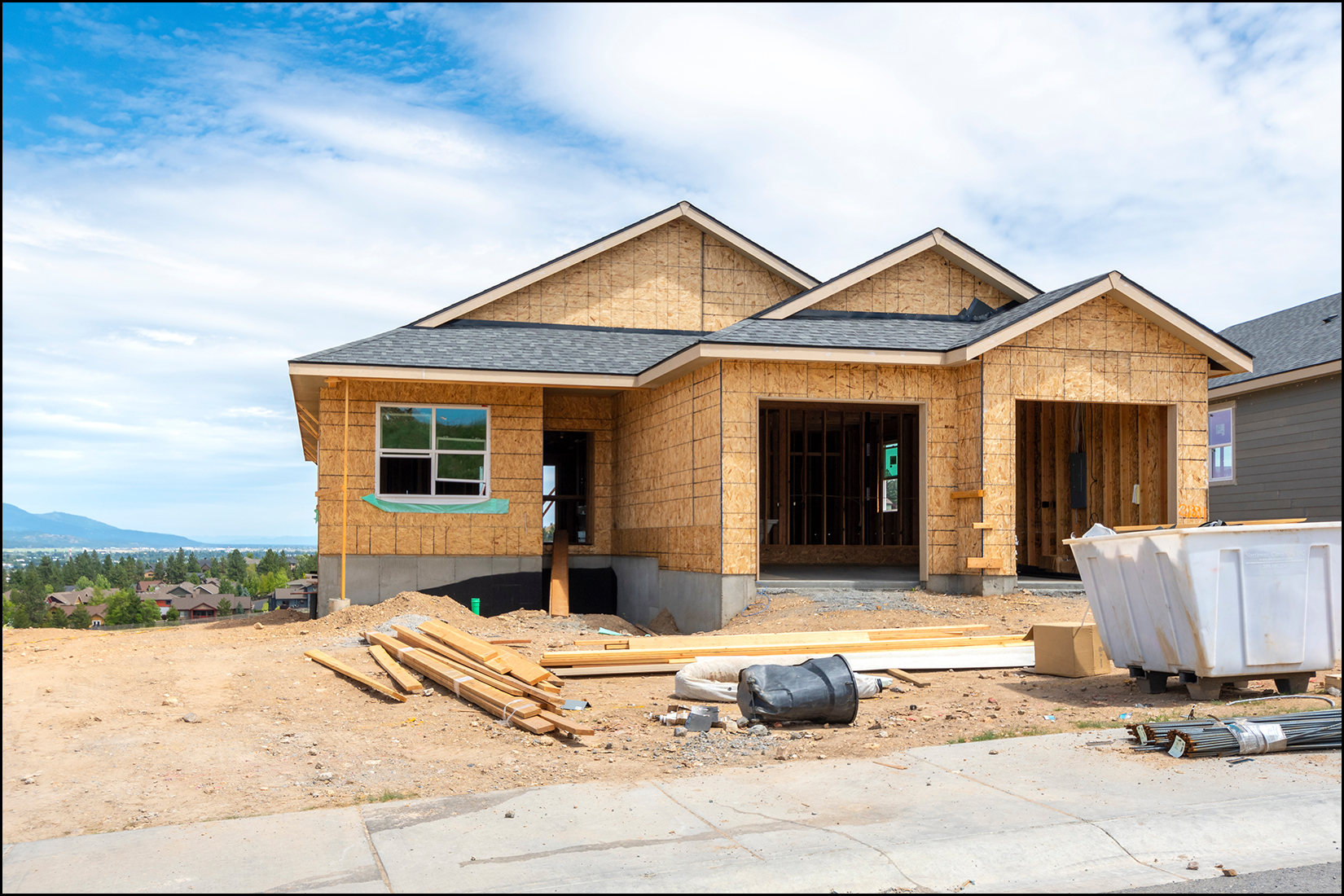 Over the past year this is where single family detached homes were built, as reflected by sales in the HRAR MLS... City of Harrisonburg = 3 homes Rockingham County = 58 homes When looking at development proposals in the City of Harrisonburg here's the breakdown of property types being proposed... Apartments = 74% or 2,747 homes Townhomes or Duplexes = 21% or 771 homes Single Family Detached Homes = 6% or 206 homes So, I suppose it is reasonable to ask or wonder... how many more single family detached homes be built in the City of Harrisonburg? Perhaps the vast majority of single family homes that will ever exist in Harrisonburg have already been built? Perhaps over the next 10, 20 and 30 years, 95% or more of new housing units will be apartments, townhouses or duplexes? After all, the City will eventually run out of land for building more housing. As it currently stands, if you are going to buy a new single family home in the next few years it seems almost certain that it will be in Rockingham County, not the City of Harrisonburg. | |
| Older Posts |
Scott Rogers
Funkhouser Real
Estate Group
540-578-0102
scott@funkhousergroup.com
Licensed in the
Commonwealth of Virginia
Home Search
Housing Market Report
Harrisonburg Townhouses
Walk Through This Home
Investment Properties
Harrisonburg Foreclosures
Property Transfers
New Listings

